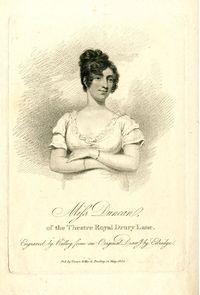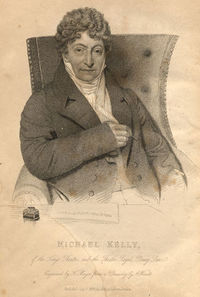Annotation:Mischievous Bee (The): Difference between revisions
No edit summary |
No edit summary |
||
| Line 10: | Line 10: | ||
''He felt that his finger was stung by a Bee.''<br> | ''He felt that his finger was stung by a Bee.''<br> | ||
</blockquote> | </blockquote> | ||
The '''Universal Magazine of Knowledge and Pleasure''' (London, 1807, p. 446) reviewed it: | Cupid then asks for "revenge on the mischievous bee" from his mother, Venus. The '''Universal Magazine of Knowledge and Pleasure''' (London, 1807, p. 446) reviewed it: | ||
<blockquote> | <blockquote> | ||
''The song before us has certainly a pleasing melody, and is well adapted to the piano-forte, but'' | ''The song before us has certainly a pleasing melody, and is well adapted to the piano-forte, but'' | ||
Revision as of 22:49, 23 November 2013
Back to Mischievous Bee (The)
MISCHIEVOUS BEE, THE. English, Air and Jig. C Major. Standard tuning (fiddle). AB. "The Mischievous Bee" is a song sung by Miss (Maria Rebecca) Duncan (1783-1858) in the comedy Time's a Tell-tale, written by Henry Siddons with music by Dublin-born singer, composer and theater-manager Michael Kelly (or Kelley) (1762-1826). The play was staged in 1807 at the Theatre-Royal, Drury Lane (see also the eponymous air from the play, "Time's a Tell Tale"). The lyric begins:


Little Cupid one day o'er a myrtle bough stray'd
And among the sweet blossoms he wantonly play'd
Plucking many a leaf from buds of the tree,
He felt that his finger was stung by a Bee.
Cupid then asks for "revenge on the mischievous bee" from his mother, Venus. The Universal Magazine of Knowledge and Pleasure (London, 1807, p. 446) reviewed it:
The song before us has certainly a pleasing melody, and is well adapted to the piano-forte, but we think it has not a strict claim to originality. The words are translated from Anacreon, and possess (as a translation) considerable merit.
The song was popular and appears in collections and song-sheets on both sides of the Atlantic through the mid-19th century.
Source for notated version:
Printed sources: Harding's All Round Collection, 1905; No. 111, p. 35.
Recorded sources:
